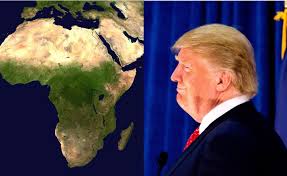
African Leaders Say Talks Focus on Visas and Trade, But Yield to U.S. Pressure to Accept Deportees

Uganda has announced that it will ”temporarily” accept migrants deported from the United States, joining a growing list of African governments aligning with President Donald Trump’s administration’s mass deportation efforts under a sweeping immigration crackdown.
The Uganda Ministry of Foreign Affairs said on Thursday that the agreement would cover third-country nationals who had been denied asylum in the U.S. but refused to return to their countries of origin. Kampala stressed that it would not accept ”unaccompanied minors or individuals with criminal records” and said it would prefer deportees from within Africa.
This is a temporary arrangement with conditions including that individuals with criminal records and unaccompanied minors will not be accepted,” Vincent Bagiire Waiswa, the ministry’s permanent secretary, said in a statement.
The announcement marked a turnaround. Just one day earlier, Foreign Affairs Minister Henry Okello Oryem told the media that while Uganda has a benevolent refugee policy, there are limits. He dismissed reports that such a deal was in place, insisting that Uganda lacked facilities to accommodate deportees.
He said government discussions with Washington were focused instead on “visas, tariffs, sanctions, and related issues, not accepting illegal aliens from the U.S. That would be unfair to Ugandans.”
The about-face highlights the pressure African governments face when negotiating with Washington. President Yoweri Museveni of Uganda now joins Rwanda’s Paul Kagame, South Sudan’s leaders, and Eswatini’s King Mswati III in cooperating with President Donald Trump’s administration on deportation deals.
South Sudan, still grappling with internal conflict and economic collapse, was reportedly pressed by Washington during sensitive talks over aid and sanctions relief. The South Sudan government conceded to what could be regarded as “negotiation of survival.”
Eswatini’s King Mswati III, one of the world’s last absolute monarchs, accepted the arrangement, according to reports. These countries made their asks, from lifting sanctions to unfreezing bank accounts, revealing a controversial exchange that has sparked outrage among human rights advocates.
Museveni’s Uganda, already hosting more than 1.4 million refugees from South Sudan and the Democratic Republic of Congo, has stepped into the fold. Kampala’s acceptance is less about humanitarian responsibility and more about keeping diplomatic ties with Washington smooth, at a time when Uganda faces mounting pressure over governance, sanctions threats, and aid conditionalities.
U.S. leverage often comes down to the interests of African leaders. Museveni, Kagame, Kiir, and Mswati are all in different ways vulnerable to U.S. pressure. For some, it’s about avoiding sanctions, for others, it’s about aid flows or keeping the door open for their families’ futures abroad.
For Uganda, the new arrangement raises troubling questions. The country is already stretched thin by its refugee responsibilities. Recall that the United States Government earlier cancelled all visas held by South Sudanese nationals and suspended issuing new ones. This significant decision affects students, professionals, and even longtime residents with Green Cards, following South Sudan’s decision not to take back its citizens who were ordered to be deported from the U.S.
In a related development, revelations from Axios in July 2025 noted that Israel asked the U.S. to help persuade countries such as Ethiopia, Indonesia, and Libya to accept Palestinians from Gaza.
Read Also: Billboard Unveils 50 Greatest Afrobeats Songs of All Time
About The Author
Related Articles
AES Condemns Niamey Airport Attack, Warns of Coordinated Destabilisation
The Alliance of Sahel States has strongly condemned the armed attack on...
ByWest Africa WeeklyFebruary 2, 2026Mali Cedes Strategic Land to Guinea to Deepen Trade Cooperation
Mali has approved the transfer of a strategic parcel of land to...
ByWest Africa WeeklyFebruary 2, 2026Senegal to Appeal CAF Sanctions After AFCON Final Controversy
Senegal has announced plans to formally appeal the sanctions imposed by the...
ByWest Africa WeeklyFebruary 2, 2026Burkina Faso Takes Legal Step Toward Nuclear Energy Development
Burkina Faso has voted to join the Vienna Convention on Civil Liability...
ByWest Africa WeeklyFebruary 2, 2026












Leave a comment